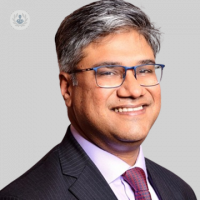Primary liver cancer surgery
Written in association with:Hepatocellular carcinoma (HCC) is the sixth most common cancer worldwide and affects millions of people every year. In the first of a two-part series, consultant hepato-pancreato-biliary surgeon Mr Deepak Hariharan shares his vast expertise on surgical treatment of this condition.

How can surgery treat liver cancer?
The incidence rate of HCC is fast rising across the world due to the increasing prevalence of obesity, diabetes and alcohol consumption. The treatment strategies for HCC remain multimodal and multidisciplinary. This type of cancer is poorly responsive to chemotherapy and radiotherapy. In a select minority of cases, surgery in the form of liver resection along with liver transplantation remains the key treatment strategy offering an effective cure for eligible cases (5-year survival rates in excess of 70% in these select groups of patients).
Is surgery used alongside other cancer treatments?
Surgery (in the form of anatomical, non-anatomical liver resection and/or liver transplantation) for cases with hepatocellular carcinoma (HCC) is the most common treatment option as it offers the greatest chance of cure. All cases with proven HCC are discussed in a multidisciplinary team (MDT) meeting comprising of a liver surgeon, a medical hepatologist, an interventional radiologist and an oncologist to determine and tailor the most effective treatment for the patient.
In order to stage the HCC disease, the MDT take into account factors such as medical history, current performance status, state of liver function (including presence/absence of cirrhosis/portal hypertension), number and distribution of lesions across the liver, size of each liver lesion and presence or absence of disease outside of the liver (peritoneal cavity, lung). This helps the team determine if surgery to affect cure is feasible at all, recommend a range of treatments in the event surgery is not possible and informs shared decision making with the patient. Early-stage HCC is treated with surgery or radiofrequency/microwave ablation (if surgery isn’t possible).
Treatment options for intermediate stage disease include locoregional therapies such as trans-arterial embolization (TAE), trans-arterial chemoembolization (TACE lipoid mixed with chemotherapeutic agents or drug-eluting beads) or selective internal radiotherapy treatment (SIRT). Occasionally surgery may be reconsidered in select cases after dramatic response to mentioned treatments in cases with intermediate-stage disease. Advanced stage HCC is treated with chemotherapeutic medications.
What is the success rate of liver cancer surgery?
Liver transplantation and liver resection surgery are the sole curative options for the treatment of early-stage hepatocellular carcinoma (HCC). Liver transplant for HCC is a major undertaking, only possible in restricted clinical groups with serious limitations on the number of available liver donors. Liver cancer resection surgery, however, is possible in preselected larger subgroups of patients based on good performance status, preserved liver function, favourable liver disease distribution and adequate remnant liver volume and function. Such patients are then assessed for cardiovascular/respiratory fitness and liver resection surgery is recommended to those deemed fit enough. Inpatient hospital stay varies between 3-10 days depending on the type of liver surgery (major or minor) done.
In the absence of surgical complications and on achieving clear margins from cancer surgery on assessment of histology from the resected specimen, the five-year survival post-liver resection surgery in these select patient groups approaches in excess of 70% as compared to 12% without surgery. The average survival time is 9 months in the absence of treatment.
What are the risks of liver cancer surgery?
Over the past few decades improvements in research with regards to understanding liver surgical anatomy, targeted anaesthetic measures and specialist surgical training in liver surgery have made liver surgery extremely safe with low morbidity and mortality rates internationally.
Pre-existing physical (cardiac and respiratory function), mental, emotional and psychological states of the patient contribute and play a key role in the assessment of risks from major liver surgery. The risks from liver surgery are divided into anaesthetic and surgical risks. Surgical risk is further divided into general and specific, which can be early or delayed.
Anaesthetic risks include – Lung related complications such as pneumonia, respiratory failure, heart-related complications include myocardial infarction, cardiac failure, while brain-related complications include stroke.
General early surgical risks include Venous thrombo-embolism (clotting in the legs or lung), bleeding and infections in wounds or within the abdominal cavity (specifically liver), post-operative pain, scars, incisional hernias (early or delayed).
Specific risks include – bile leak, remnant liver dysfunction or failure and postoperative death.
Patients are subjectively and objectively risk assessed, counselled extensively in the outpatient setting and encouraged to question rationale and assess alternatives prior to listing and proceeding with liver surgery.
In part two of this article, Mr Hariharan delves further into primary liver cancer surgery including regrowth, follow up and things to avoid.
Mr Deepak Hariharan is an expert in liver, gallbladder and pancreas. Find out more about him by visiting his Top Doctors profile, where you can also request an appointment with him.


